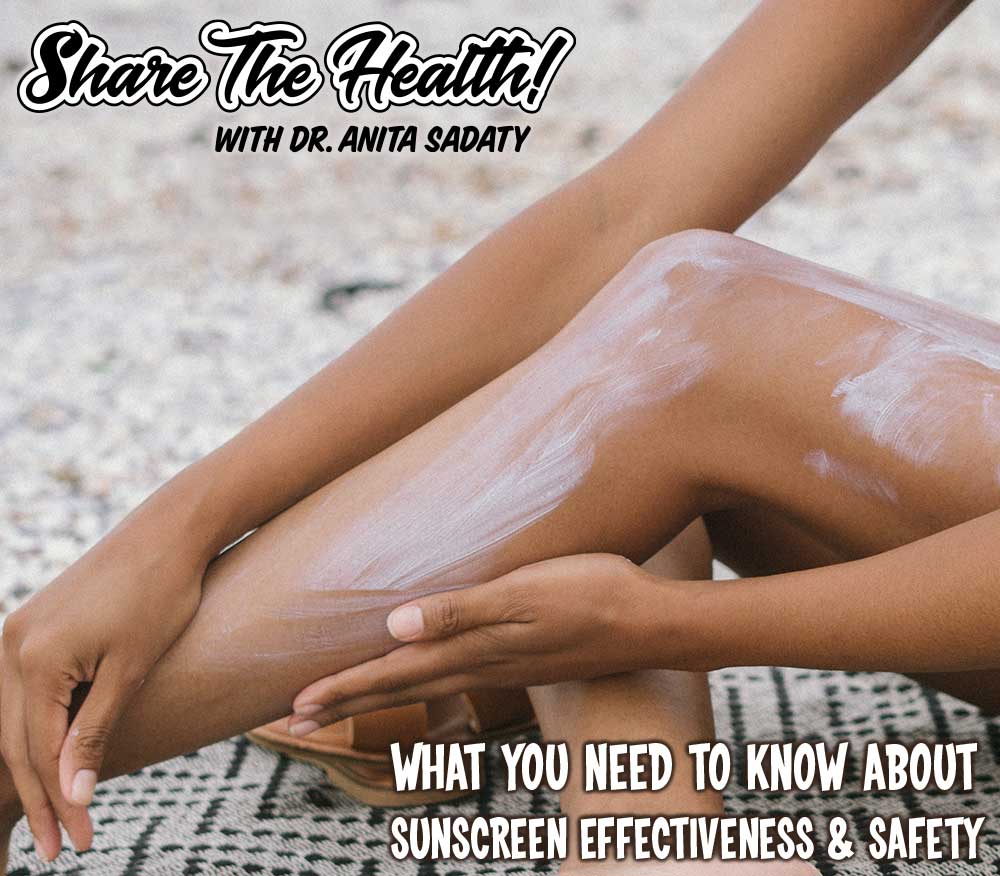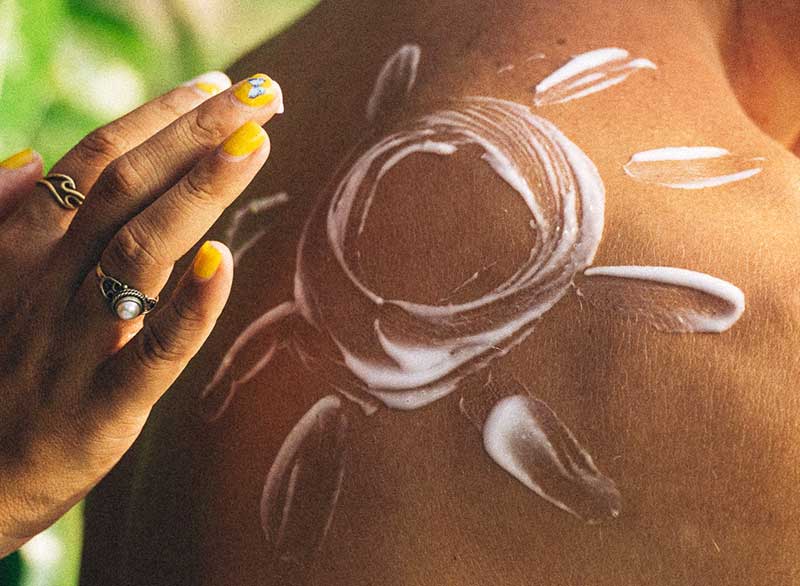
By Dr. Lucy Gade
With warmer weather upon us, everyone is looking for the least toxic and safest sunscreens they can use to protect against the risks of overexposure. Here’s what you need to know!
What You Need To Know About Sunscreen Effectiveness and Safety
Do you use sunscreen to prevent sunburns, signs of aging skin, and other harmful effects of the sun?
Every spring, the Environmental Working Group (EWG) produces a sunscreen guide to help us make informed decisions about the safest and most effective sunscreens available. A team of scientists review all the available evidence and provide the most up-to-date information about product safety. This year, over 1,850 sunscreens were rated by the EWG and only one-fourth met their standards for adequate protection while avoiding ingredients known to harm health!
So what’s the big deal?
Compared to other personal care products (e.g. soaps, lotions, shampoos), sunscreens are more concerning because you coat it thickly onto your skin AND use it multiple times a day. You don’t get that type of longtime exposure with other products. Sunscreen chemicals penetrate the skin and can build up in your blood leading to systemic effects that may last longer than expected even with just one application! Oh no!
UVA vs. UVB and SPF
Sunlight consists of both UVA and UVB rays:
- UVB rays cause more sunburns compared to UVA rays but UVA rays can damage your skin invisibly by suppressing the immune system.
- UVA damage leads to premature aging and increased susceptibility to skin cancers. Most individuals select sunscreens based on their SPF (Sun Protection Factor).
- The SPF value reflects how well a sunscreen protects from UVB rays not UVA rays. There is no requirement that sunscreens be made to offer protection against both.
- U.S. sunscreen regulations haven’t been updated since 2011!
Basic Guidelines for Sunscreen Selection:
- There is no perfect sunscreen.
- The EWG consistently recommends sunscreens with the mineral active ingredients such as zinc oxide and titanium dioxide which though much less toxic, still contain nanoparticles or tiny ingredients that CAN cross the blood-brain barrier and harm the environment).
- Spray sunscreens are not recommended because they are difficult to apply consistently and there may be additional risks from chemical inhalation.
- A high quality sunscreen needs to provide protection from both UVA and UVB rays. This is known as “broad-spectrum” protection.
- The “best picks” in the database are those with Scores of 0-2. Higher scores indicate poorer safety ratings.
The following is a short list of products that made EWG’s “best sunscreen” list for 2022. A more comprehensive list can be found on their website.
- 365 Everyday Value Mineral Sunscreen Sport Lotion, SPF 30
- Beautycounter Countersun Daily Sheer Defense for Face, SPF 25
- Black Girl Sunscreen Melanin Boosting Moisturizing Sunscreen Lotion, SPF 30
- Raw Elements Face + Body Sunscreen Lotion, SPF 30
- Supergoop! Daily Correct CC Cream Lotion, SPF 35
- Thrive Market Mineral Sunscreen, SPF 30

Sunscreen Is NOT the ONLY Tool in the Sun Safety Toolbox
➔ You can’t rely on sunscreens alone to prevent overexposure.
➔ No product is fully protective.
➔ Sunscreen use can give people a false sense of security.➔ One study showed that individuals who relied solely on sunscreens for sun protection got more sunburns than those who reported using less sunscreen but wore hats and clothing for protection.
➔ Tips for Avoiding Overexposure:
- Wear protective clothing to avoid direct effects of sun exposure e.g. long sleeves, wide brimmed hats.
- Wear a safe, less toxic sunscreen daily. Make it a habit. Apply it 20-30 minutes before going outside.
- Reapply sunscreen whenever you come out of the water and every 2 hours when dry.
- Whenever possible, avoid sun exposure: Sit in the shade or avoid peak sun hours (between 10am-3pm) when UV rays are the strongest.
- Wear sunglasses that filter UV light. This can help prevent the formation of cataracts.
What about Vitamin D?
Vitamin D is an important micronutrient and deficiency has been linked to certain cancers, autoimmune diseases, heart disease, depression, osteoporosis and many other medical conditions.
Does sunscreen use ACTUALLY lead to Vitamin D deficiency?
UVB rays trigger vitamin D production in the skin. Many individuals have less than optimal Vitamin D levels. Because UVB rays are the ones that sunscreens block best, there is concern that regular sunscreen use may be contributing to Vitamin D deficiency. Clinical studies

10 to 15 minutes of UNPROTECTED sun exposure a day, two to three times a week, followed by consistent sun protection is what is recommended for Vitamin D production. People with darker skin may need closer to 30 minutes a day.
Some food sources of Vitamin D include: fish (e.g., halibut, wild caught salmon, sardines), pastured eggs, caviar, beef liver, almond milk, and mushrooms. Despite eating a good diet, most individuals will require additional Vitamin D supplementation to achieve optimal levels.
Please Note: that consistent fish oil consumption and Vitamin A can mitigate the effects of sun damage on the skin, so don’t skimp on those two nutrients either!
The Bottomline
Sunlight (in small doses) provides health benefits, including helping our bodies manufacture Vitamin D. With warmer weather upon us, many people are looking for the least toxic and safest sunscreens they can use to protect against the risks of overexposure. The burden is on us to find the safest, most effective sunscreens to keep our families safe. The EWG provides a valuable up-to-date guide that can help you make the best choices. Because no sunscreen is 100 percent protective, remember that there are other measures that can help keep your skin safe.
If you are interested in learning more about our programs and products for healthy skin, please contact the office to schedule a complementary 15 minute session with Rona, our skin expert.
If you are concerned about having sub-optimal levels of Vitamin D and/or other important micronutrients to support optimal wellness, consider making a Functional Medicine appointment with Dr. Sadaty or myself.
Please Share the Health if you liked what you read!!!
For more information about my wellness programs and my practice, check out my website drsadaty.com. Hey Look! You are already here…
Ready for the legal disclaimer? Information offered here is for educational purposes only and does not constitute medical advice. As with any health recommendations, please contact your doctor to be sure any changes you wish to consider are safe for you!